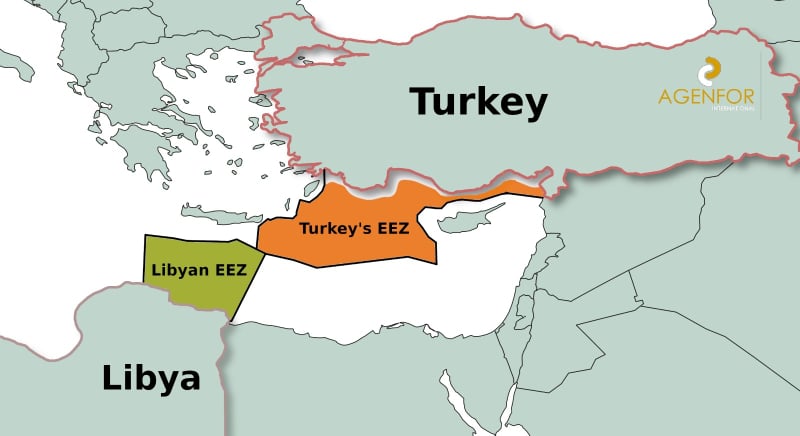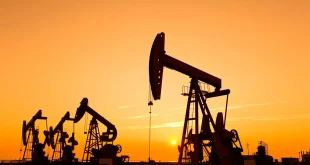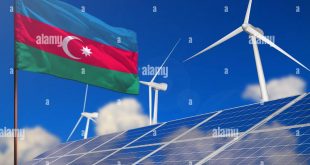Disputes over right to explore gas in Eastern Mediterranean have become a very contentious issue during the last few years. Especially after Turkey in January 2020 signed maritime deal with the Tripoli- based Government of National Accord (GNA). Turkey signed the bilateral maritime deal with Libya in response to the formation of East Med Gas Forum (EMGF) by Greece, Greek Cyprus administration (GCA), Egypt, Israel and Italy while bypassing Turkey and not heeding to its requests for exploration rights of divided Turkish Republic of Northern Cyprus (TRNC) which is recognized only by Turkey. We spoke to Omid Shokri Kalehsar, an Energy expert based in US who has been watching very closely the energy related developments in the Eastern Mediterranean Sea.
Please elaborate the root cause of dispute over gas exploration opportunities in the Eastern Mediterranean. Why did Turkey sign a sudden maritime deal with the Government of National Accord (GNA)?
The discovery of new energy sources has always provided governments with an opportunity to invest in these fields, to meet their domestic needs to a certain extent, and to have more bargaining power to sell them locally and globally. The growing need of major energy-consuming countries has always been an important factor in determining the market for old and new energy sources. Today, increasing the share of natural gas in the energy basket of major consumer countries has led to a shift in the geopolitics of energy from oil to gas, and huge gas resources in the Mediterranean can also be crucial in geopolitical shift of energy from oil to gas.
Why didn’t member countries of EastMed Gas Forum invite Turkey to be part of it? Did this step backfire?
Different interests of some countries in the region with Turkey in terms of regional issues have made Turkey out of the energy games. Turkey needs economically and geopolitically managed maritime energy resources, and therefore, needs comprehensive policies towards the countries to maximum political and economic benefits. The Turkish Foreign Ministry spokeswoman Hami Aksu said in a statement that the effort to turn the bloc into an international organization without inviting Turkey and the Northern Cyprus. And Egypt, Cyprus and Greece have stepped up their efforts to extract gas and oil from the Mediterranean. I think Turkey was not invited to the East Med Gas Forum due to Turkey’s regional and foreign policy and differences between Turkey and these countries in terms of this region.
It has been reported in Turkish media that Turkish Petroleum Corporation has sought exploration rights in the Eastern Mediterranean from Libya. How will it impact the ongoing stand-off in the Eastern Mediterranean?
Last November, Turkey made a deal with the Libyan National Unity Government to stay out of the region’s energy equilibrium. Following the signing of the agreement, the Turkish Foreign Ministry issued a statement to set part of Turkey’s maritime borders east of the Mediterranean. According to the Turkish Foreign Ministry spokesman Hami Aksu, “the deal is in accordance with the principles of international law, the UN maritime law and the legal requirements of international courts.”
The Turkish Foreign Ministry cited joint statement by the UAE, Egypt, Greece, France and Cyprus condemning Ankara’s activities in the Mediterranean and Libya as reasons for their “duplication of standards.” Egypt, Greece, France, and Cyprus on the Mediterranean Sea are a reason for the duality of the standards of these countries.
It seems France is leading the group of five countries whose foreign ministers criticised Turkey’s Libya operations and the maritime deal. Why is France opposing Turkey’s EastMed gas exploration?
As a key member of EU, France supports Greece and Cyprus in the region and it is not in favour of Turkey’s national interest. It should be noted that Turkey and France have a different policy and interests in Syria crisis. Turkey many times asked other countries not support and supply military equipments to the YPG, the Syrian offshoot of PKK which is designated as a terrorist organisation by the US, EU and Turkey. Turkey must take measures in the eastern Mediterranean to protect its interests. Signing a memorandum of understanding with Libya was one of the most important steps it has taken in this regard.
It is reported that Israel is also seeking to strike a deal with Turkey of the same nature as the deal between Turkey and Libya. What are the possibilities of a Turkey-Israel deal in EastMed and how will it affect the plan of the EastMed Gas Forum?
If Turkey is able to amicably resolve its political issues with the Mediterranean countries, it can play a more active role in the energy equations of the region. By reviewing its foreign policy in the region and resolving existing problems with Israel and Egypt, Turkey can play a role simultaneously in regional projects and use the region’s existing gas resources in its energy security, as well as in Europe’s energy security. Given that Turkey’s economy is economically viable to transport gas to EU. The European Union (EU) condemned Turkey’s efforts to drill off the coast of Cyprus as part of a crisis over gas exploration and accused Turkey of escalating tensions. Twenty-seven EU member states have repeatedly told Turkey to not conduct exploration drilling. Gas and oil will end off the coast of Cyprus, as they are an encroachment on the economic zone of Cyprus, which is a member of the European Union.
It is natural that the European Union will always take into account the interests of Cyprus and Greece, and that Turkey can create a balance in the region by resolving its problems with Israel and Egypt in exchange for European support for Cyprus and Greece. Improving Turkey’s political relations with Egypt and Israel could both increase trade between the two countries and provide more opportunities for Turkish companies to invest in the country. Turkey could negotiate a more active role in the Mediterranean, starting with Cyprus and Greece to solve the existing problems. Turkey’s policy in Syria could also affect the future of the Mediterranean energy game and geopolitics. Turkey could play a more active role in the Mediterranean with the United States, although the United States has sometimes publicly protested Turkey’s drilling operations off the coast of the Mediterranean.
How do you see the settlement of the dispute over exploration rights in the East Mediterranean Sea?
It should be noted that natural gas resources in the Mediterranean Sea is not a game changer in world energy market and regional market as well. With respect to oversupply in the natural gas and LNG market, there is no immediate demand for natural gas resources in the Mediterranean Sea. The East Med pipeline has a financial problem, yet there is a major financial institute to financially support and provide credit to this project. Israel has its own resources and does not have an urgent need for the East Med natural gas, Israel merely geopolitical interests in the region. The price of East Med Natural Gas is too high for final costumers, and they will be able to supply their demand from other resources. Turkey lost best chance to play an important role in the East med energy game, yet it holds a potential to be an active player in the region.
As I mentioned before to avoid entrance to Turkish territorial waters, this needs to be done in the depths of the high sea, and will substantially increase the cost. The longest and deepest open sea natural gas pipeline project in the world has been from the very beginning subject to technical and economic challenges. In addition, subsequent to the Turkey and Libya maritime agreement, legal issues are likely to emerge because the project involves a pipeline that extends along a marine area under Turkey’s scope of authority.
Turkey needs to sign agreements with other East Med coastal countries too. If Turkey will be able to sign such agreements, Turkey has a chance to play more active and vital energy policy in the region. Numerous meetings have been held with the leaders of the countries involved in order to discuss the future of Mediterranean resources. Due to prevail tensions between Turkey and some of the countries in the region, Turkey has not attended some of these meetings; its absence has reduced its presence and impact on regional equation.
https://www.agenformedia.com/publication/interview-omid-shokri-kalehsar/





